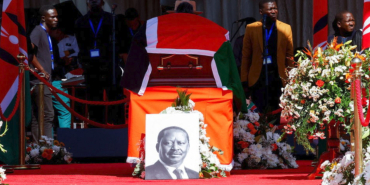How Deportation From America Led Two Kenyans to Reinvent Their Lives and Inspire Others

The personal stories of Kenyans Mwali Muyumbu and Levis Kones illustrate the resilience and reinvention possible even after deportation from the United States.
Their experiences are particularly relevant as conflict resolution specialist Mukurima Muriuki warns that deportation is increasingly a central policy, disproportionately affecting African nationals, including Kenyans. Under policies funded by legislation colloquially known as the "Big Beautiful Bill," the United States has expanded detention capacities and expedited deportation processes, heightening concerns within immigrant communities.
Muyumbu and Kones, now authors, have transformed their personal tribulations into literary reflections that challenge the traditional "American Dream" narrative and explore the complexities of starting over after forced relocation. Mwali Muyumbu's forthcoming book, Deported to Destiny, scheduled for release on 1 August 2025, recounts his life-altering experience after returning to Kenya for his mother’s funeral. His visa was subsequently cancelled, a decision he attempted to appeal, but the unfolding events occurred in the wake of the 9/11 attacks, which significantly altered US immigration policy and national sentiment.
“I was just 24, and full of hopes and dreams,” Muyumbu writes in his memoir, reflecting on how the loss of his mother and the disruption of his academic aspirations abroad abruptly eroded his identity as a young professional.
His family faced further hardship upon his return, with siblings losing their jobs, compounding the initial misfortune. However, this period of turbulence also marked the beginning of Muyumbu's reconstruction. Initially, he found solace in nightlife as a DJ, but later embraced faith, leading him to abandon the party scene. His subsequent employment at Samsung Electronics, where he oversaw operations across 28 African nations, signifies a significant pivot toward regional leadership and corporate success.
“I was reminded that I was chosen from over 300 master’s students,” he writes, attributing his ascent to divine providence.
Muyumbu's story culminates in advocacy, challenging the structural drivers of migration and urging Africa to evolve in order to retain its talent and prevent its youth from “becoming slaves elsewhere." He posits that migration should be a choice, not a necessity born out of desperation. Levis Kones, on the other hand, presents a narrative rooted in personal illness, social rehabilitation, and transnational advocacy in his autobiographical work, There is No Useless Experience, published in 2022.
Initially, the book chronicled his battle with colon cancer, diagnosed in 2018. Kones documented his chemotherapy sessions, surgeries, and emotional struggles on Facebook, which garnered a following that encouraged him to compile his experiences into a book. Beyond his struggle with cancer, deportation is a recurring theme. Like Muyumbu, Kones was removed from the US for violating the terms of his F1 student visa.
His re-entry into Kenyan society was met with stigma and social alienation. “It was like I was a leper,” he recounts, reflecting on the suspicion and derision he encountered in church, community gatherings, and informal circles.
Kones's parents expressed palpable disappointment. His return home created an atmosphere of unspoken grief and a visible reminder of perceived failure. “Every time we looked at each other,” he reflects, “there was that feeling of failure in the room.”
Despite these challenges, Kones embarked on a path of redemption. He battled alcoholism, entered rehabilitation, and participated in the nationally televised "Slimpossible" weight-loss competition. There, he met his future spouse, although their relationship faced public scrutiny and a defamation campaign initiated by a former partner. Kones now resides in Australia, where he serves as a volunteer counsellor for the New South Wales Police Department. His work focuses on assisting African students facing legal difficulties, offering empathy grounded in his own experiences.
“If I didn't get deported, I’d not be having a story that someone else could read,” Kones states. “Stories of failure are what people read more than stories of success.”
Muyumbu and Kones share a common thread. The psychological toll of deportation need not result in the permanent loss of dignity or ambition. They argue that the experiences shaped by failure, illness, and social rejection can be reframed as platforms for resilience and mentorship. These transformations are occurring at a time when immigration discourse is increasingly defined by security and exclusion. Under the Trump administration’s policies, deportation is framed as both a deterrent and a disciplinary tool.
However, the lived experiences of those deported indicate that the outcomes are more complex than mere removal from foreign soil. The long-term effects include fractured identities, altered career paths, and renegotiated definitions of success.
Beyond the individuals profiled, the broader narrative highlights a need for structural re-evaluation. Deportation is often viewed as a conclusive act, an endpoint. Yet, as Muyumbu and Kones demonstrate, it can be the beginning of a deeper reckoning with self, society, and service.
In reframing deportation from tragedy to transformation, Muyumbu and Kones contribute not just to literature but also to policy discourse, humanising a process that is too often reduced to statistics and executive orders. Their message to others facing similar fates is clear: deportation may derail dreams, but it does not define destiny.








Add new comment